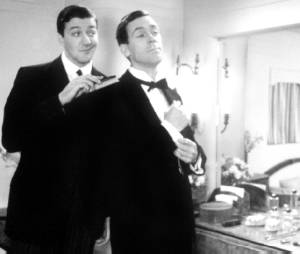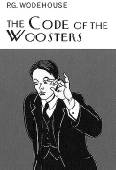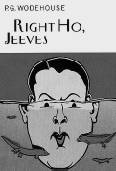The funniest writer ever to put words on paper
Lynne Truss

His most famous creations: Stephen Fry and Hugh Laurie appear as Jeeves
and
Wooster in the television adaptation of Wodehouse's work
There was a time, not so long ago, when you had to look hard for P.G.
Wodehouse in the bookshops. Heading for the end of the alphabet, you would
locate the big reliable section on Woolf, scan back a bit, and when you
found yourself knocking up against Winterson, you knew they didn't have
any.
But times have changed. The first four volumes of a handsome collectable
hardback edition of Wodehouse's novels and stories has just been launched
by Everyman, to join the already established new Penguin paperback. And
given the phenomenal number of titles in the oeuvre (Everyman intends an
80-volume uniform edition; Penguin has already reached its 60th), he
already stretches for yards. Everyman is also launching an annual prize for
the best comic writing of the year, the Bollinger Everyman Wodehouse prize,
to be given each year at The Sunday Times Hay-on-Wye Festival of Literature
at the end of May. This years' judges are Jo Brand, Craig Brown and Stephen
Fry.
Whether Wodehouse deserves the attention is not in doubt. As far as comic
writing is concerned, he is the real tabasco. "Sublime comic genius," says
Ben Elton on one of Penguin's covers. "The funniest writer ever to put
words on paper," wrote Hugh Laurie. Kathy Lette joined in, and Arabella
Weir. Clearly, if there were a collective noun for accolades, it would be a
Plum.
And what are they all raving about? Well, this sort of thing: "The drowsy
stillness of the summer afternoon was shattered by what sounded to his
strained senses like G.K. Chesterton falling on a sheet of tin"; or, "'His
name's not Lemuel?'
 'I fear so, sir.'
'I fear so, sir.'
'Couldn't use his second name?'
'His second name is Gengulphus.'
'Golly, Jeeves,' I said, thinking of Uncle Tom Portarlington, 'there's some
raw work pulled at the font from time to time, is there not?'"
Wodehouse is rarely parodied; anyone who tries to write like him looks
idiotic. So does he have a legacy? Ben Elton will have searched Luck of the
Bodkins in vain for knob gags. Did Stiffy Byng's bum look big in anything?
I don't think so.
No, what strikes with awe all other toilers in this field are the various
aspects of the chap's craft. He never chooses a heavy word where a light
one will do. His good humour is without limit. And above all, when you are
least expecting it, G.K. Chesterton falls on to a sheet of tin.
Kate Jones, his Penguin editor, says his legacy is that he simply set the
standard for comic writing. In the way he combined American slang with
perfect English, he invented a vocabulary which is permanently fresh.
Wodehouse absorbed the buzz of Broadway; and if he didn't invent it, he
perfected the sort of retort-based comedy that has its descendants in shows
like Frasier.
There is just one aspect of Wodehouse's legacy that troubles all comic
writers, and probably worries his publishers, too. Wodehouse is so breezy
and good-natured towards his public that the reader may feel uncompelled to
pick him up somehow, except for an annual treat. One could add, if one
dared, that Wodehouse trivialised comic writing; made it the inconsiderable
froth on life's doo-dah; though hastily adding that this perception applies
only among the ignorant.
 The results of this perception, however, for comic fiction writers today,
are dire. If you fancy being sneered at by people less intelligent than
yourself, become a comic novelist. "People don't want to laugh," Howard
Jacobson told me last week, when we jointly bemoaned the low status of
comic writing. "They want to cry." And then there is the towering presence
of Wodehouse himself to contend with. When comic writing of such a high
order waits on the shelf making light chitchat with the abutting giants of
literature, what hope is there for the rest of us?
The results of this perception, however, for comic fiction writers today,
are dire. If you fancy being sneered at by people less intelligent than
yourself, become a comic novelist. "People don't want to laugh," Howard
Jacobson told me last week, when we jointly bemoaned the low status of
comic writing. "They want to cry." And then there is the towering presence
of Wodehouse himself to contend with. When comic writing of such a high
order waits on the shelf making light chitchat with the abutting giants of
literature, what hope is there for the rest of us?
So it's in everyone's interest that the Wodehouses come off those shelves
as quickly as they go on. Reading one Wodehouse a year makes bad
mathematical sense, in any case. Start the 80 volumes at the age of 28, and
- well, you see where this is leading. But it has always been the way,
unfortunately. And when Wodehouse confessed in his lighthearted essay My
Gentle Readers that all his fan-letters came from invalids and chaps in
jail, I doubt the grievance was ungrounded in fact. "Dear Sir," a typical
missive would begin. "I have never read anything of yours before, as I have
always enjoyed robust health from a boy."
"You see the dilemma this places me in?" wrote Wodehouse. "If you want to
see a mind in a ferment of doubt and indecision, take a look at mine when
the papers announce that another epidemic has broken out and hundreds are
collapsing daily." Yes, it's a rotten fate, being a kind of notational
Lucozade. Something must be done. Comic fiction must at last be read by
people unweakened by disease or captivity. And one thing is for sure. You
certainly can't argue any more that the books aren't in the shops.
|
